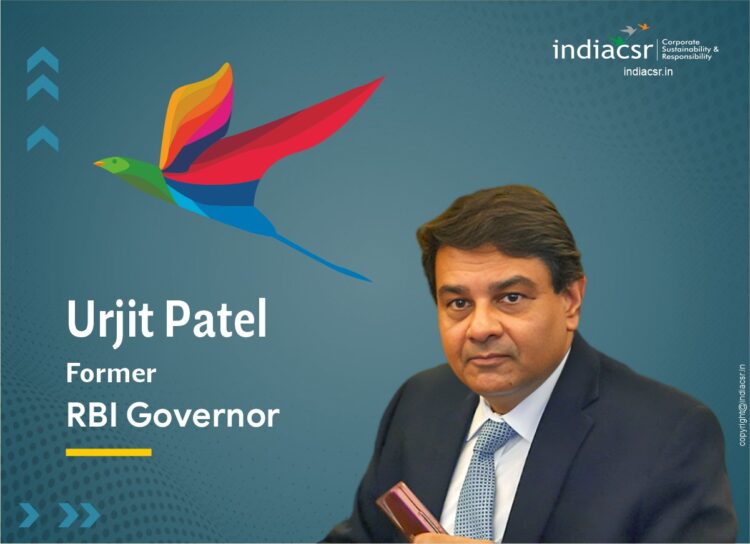Urjit Patel’s extensive background in economics, finance, and policy-making positions him as a valuable asset to Britannia’s board.
MUMBAI (India CSR): In a significant move, Britannia Industries has appointed Urjit Patel, the former 24th Governor of the Reserve Bank of India (RBI), as an additional Non-Executive Independent Director on the company’s board. This appointment is subject to the board’s approval and will be confirmed at the upcoming Annual General Meeting on August 12.
Urjit Patel’s Extensive Background
RBI Tenure and Contributions
Urjit Patel served as the 24th Governor of the RBI from 2016 to 2018. Before his tenure as governor, he held the position of Deputy Governor at the RBI from January 2013. During his time at the RBI, Patel was instrumental in several key initiatives, including representing the RBI in international forums such as the G-20 and BRICS Finance Ministers and Central Bank Governors groups.
International Roles
Patel’s influence extended beyond India. From 2022 to 2024, he served as Vice President (Investment Operations Region 1) at the Asian Infrastructure Investment Bank (AIIB), where he contributed to significant investment decisions across various regions.
Career Highlights
- IDFC Limited: Chief Policy Officer from 1997-2006
- Ministry of Power, Department of Economic Affairs, New Delhi: Consultant from 1998 to 2001
- International Monetary Fund (IMF): Covered desks for the US, India, Bahamas, and Myanmar between 1990 and 1995
- Boston Consulting Group: Advisor
- Reliance Industries: President, Business Development
- Infrastructure Development Finance Company: Executive Director from 1997-2006
- Government of India: Member of the Integrated Energy Policy Committee from 2004-2006
- Gujarat State Petroleum Corporation: Non-Executive Director
- Multi Commodity Exchange of India Limited: Non-Executive Director
- Reserve Bank of India: Deputy Governor and later Governor (from September 4, 2016)
Educational Background
Patel’s educational background is as impressive as his career. He completed his Bachelor’s in Economics from the London School of Economics and earned an M.Phil degree from Oxford University in 1986. He received his doctorate in Economics from Yale University in 1990. He has also been a non-resident Senior Fellow at the Brookings Institution since 2009.
Key Policies and Challenges
During his tenure, Patel advocated for significant changes in India’s monetary policy, including a switch to inflation targeting and the formation of a panel to set interest rates. The six-member monetary policy committee, comprising Patel, two other RBI officials, and three government-appointed members, played a crucial role in shaping India’s monetary policy.
Patel has often been compared to his predecessor, Raghuram Rajan, particularly in his endorsement of inflation targeting. Rajan successfully reduced interest rates and convinced the government to adopt a central target of 4 percent inflation, within a range of 2 to 6 percent. Patel continued these policies, focusing on controlling inflation and cleaning up bad loans in the banking sector to support investments essential for India’s economic growth.
Legacy and Impact
Despite his resignation from the RBI in December 2018, citing “personal reasons,” it was widely reported that his departure was due to a rift between the RBI and the government. Patel’s resignation midway through his term was a rare occurrence, underscoring the significant challenges he faced.
Patel’s tenure was marked by efforts to control inflation, which accelerated to 6.07 percent in July during his term, staying above the RBI’s near-term target of 5 percent. Alongside inflation control, Patel focused on addressing the issue of bad loans in banks, ensuring they could support necessary investments for India’s economic stability and growth.
Additional Board Appointments
In addition to Patel’s appointment, the Britannia board has also appointed Sunil Lalbhai as the Chairman and Managing Director of Atul Limited for a five-year term. This strategic move is expected to strengthen the company’s leadership and governance.
Controversies and Challenges
Urjit Patel’s career has not been without controversy. According to former finance secretary Subhash Chandra Garg’s book ‘We Also Make Policy,’ BJP leader and Prime Minister of India Narendra Modi referred to Patel as a ‘snake who sits over a hoard of money.’ This comment reflects the tension between the government and the RBI during Patel’s tenure, highlighting the challenges he faced in navigating the complex relationship between India’s central bank and the government.
(India CSR)





















